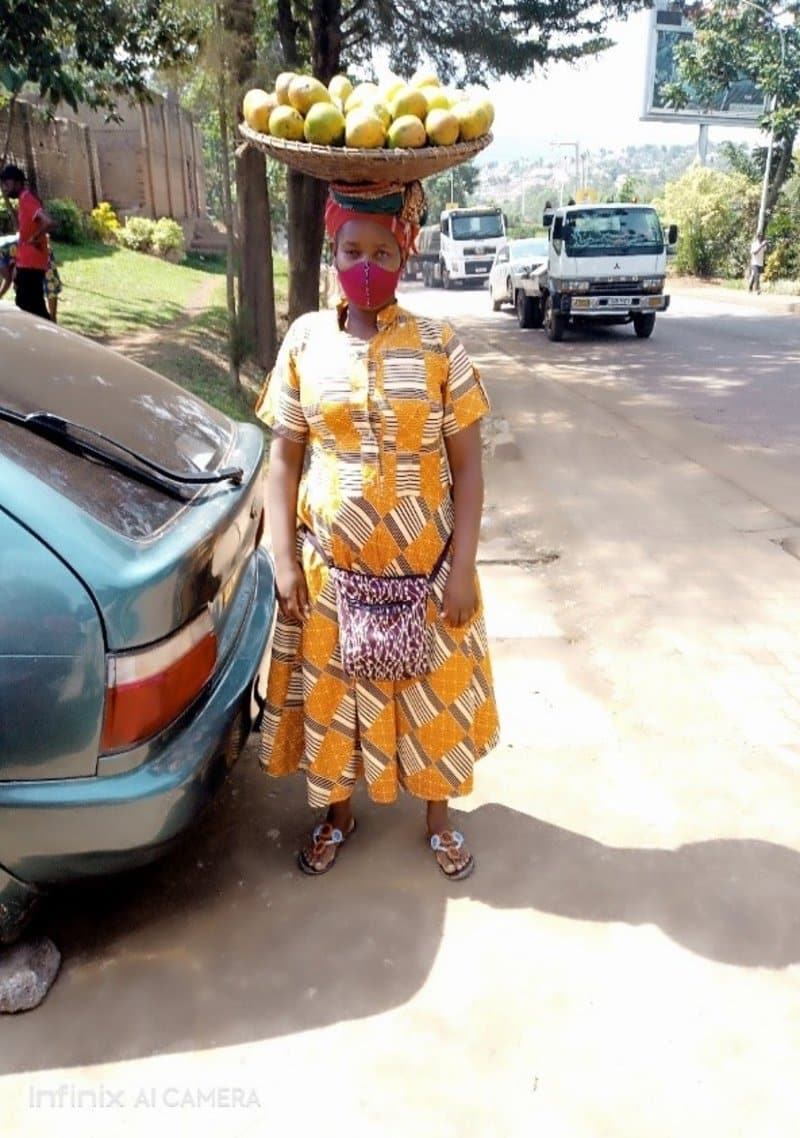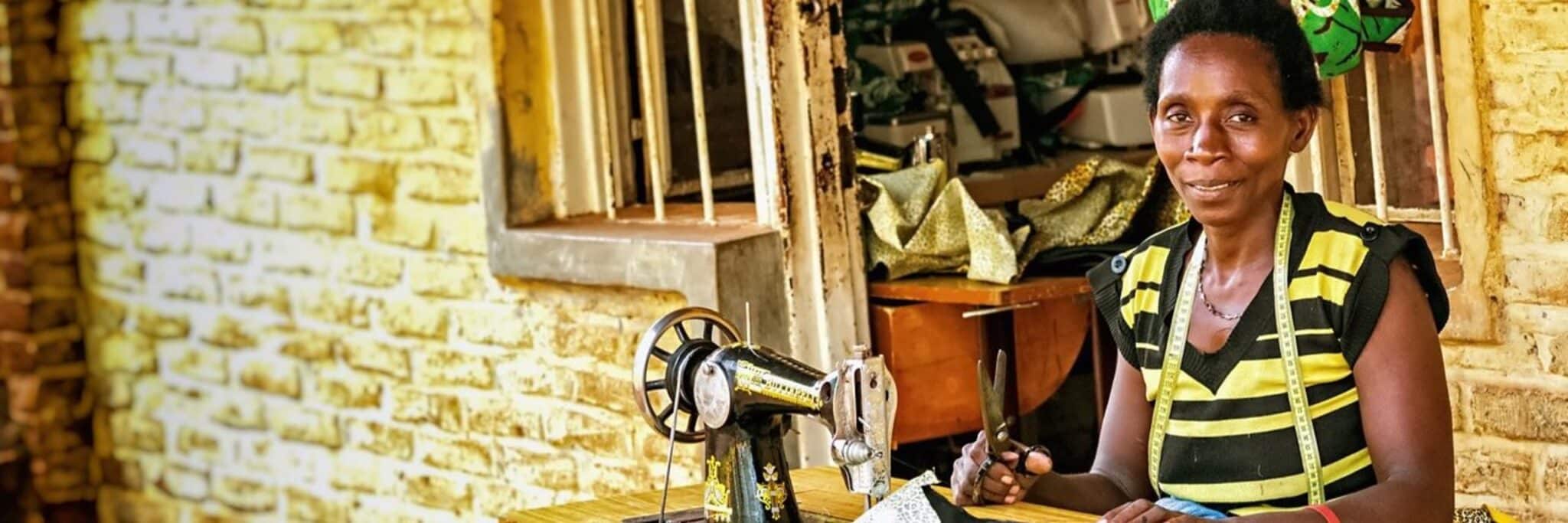
Claudine is a street vendor in Kigali, selling vegetables and second-hand shoes on the streets of Kigali’s Jabana district. She studied to 5th grade in secondary school but dropped out when she became pregnant. When her husband died, Claudine became a single mother to her two children – as a result, she started her work as a street vendor. Claudine is an example of high resilience and adaptability: with her work she was able to pay school fees for her children and her eldest daughter is now a trained primary school teacher. Claudine is also an active member of an informal savings group which helps her save and invest in her business.
The Covid lockdowns were a huge economic shock for Claudine as for many men and women working as street vendors. Her sales dropped and her business collapsed to the point that she depended on government food hand-outs and support from friends and family to survive. With Covid restrictions easing, Claudine’s work has now picked up again.
Fatima is a skilled plasterer and construction worker. When she became an orphan at a young age, her aunt and extended family took her in. Having dropped out of senior school, she entered the construction sector because ‘it’s a profession not taken by many girls’, as she says. She started as an unskilled labourer to learn a trade, and after six months she became a fundi (skilled worker) in plastering. However, she does not have a certificate for her skills and gets work from informal labour markets on street corners. Her family struggled during Covid and she used her savings to help feed them. She enjoys the independence of earning an income and helping the family but would like to learn more skills and does not belong to an association that can help her.
Kigali’s initiative to build the resilience of informal workers
The City of Kigali seeks to help women like Claudine and Fatima who work in the city’s informal economy. To do so, the City of Kigali’s Urban Economic Development Unit and Resilience team proposed an Action Plan. As part of the plan, the Urban Economic Development Unit aims to recognise the needs of the city’s vulnerable informal workers, particularly women. Furthermore, the Action Plan aims to build the resilience of the City’s informal workers and facilitate post-pandemic recovery.
The development of the Action Plan was supported by the Investment Climate Reform (ICR) Facility. The Action Plan was a bold move by the City of Kigali, as it is unusual for local governments to recognise the potential of this vulnerable workforce. The City is now developing a project to over 6,000 informal workers, mostly women, over the next five years, with the aim of building resilience to economic shocks, improving working conditions of informal workers, enhancing access to employment, and empowering Kigali’s women workers and street vendors.
Official figures show that nearly half of all Kigali women of working-age were in work, compared to two thirds of men. Working women, however, face many challenges, including limited schooling and the need to combine paid work with child-care. The majority of women work informally without social protection or a regular income. Some join government-sponsored health insurance and pension schemes, but many do not. Covid-19 hit Kigali’s women workers hard, and many, including Claudine, only survived with the help of government food parcels distributed through the local administration of Sectors and Cells, which targeted poorer households.
Numbers of informal workers in the city are high. Statistics suggest that about 40-60% of Kigali’s total workforce of nearly 700,000 people works informally. Numbers may be even higher, but as in many fast-growing cities, Kigali lacks sufficient disaggregated data to underpin effective policy to support women and other workers. Although throughout much of Africa, more women than men work informally in cities, Kigali does not yet have a gender breakdown in the statistics. However, women work in many informal sectors, particularly in trades such as basket weaving, street vending, home deliveries or tailoring, but also in more male-dominated trades such as waste picking, bar work and construction. At joint ICR Facility-Kigali City workshops for the development of the Action Plan, women and men from these sectors expressed their challenges such as the difficulties of balancing child-care with work particularly in women-headed households; lack of business and marketing skills; a lack of toilets and changing facilities for those who work in public space, and lack of space for constructive dialogue with the authorities. Such challenges were reflected in the Action Plan for policy-makers to take action on the recommendations provided.
Promoting policies to improve women’s resilience
The Action Plan developed by the municipality of Kigali and the ICR Facility showed how small-scale initiatives can have big impacts for workers such as Claudine and Fatima, for example by providing secure space for street vendors and accessible training for other trades. The Action Plan also revealed the considerable policy potential to improve security and working conditions, by leveraging the frequent national labour force surveys and enterprise censuses to collect disaggregated data on informal workers by gender, location and economic sector; providing secure trading space for street vendors; linking worker savings groups and cooperatives to financial institutions, and improving the working environment and visibility of informal workers through trade fairs and worker festivals. Most importantly, the City of Kigali’s approach recognises the value of partnership and dialogue between local administrations and women workers to help vulnerable citizens, foster innovative policy response and support city-wide economic development.
Some of the recommendations of the ICR Facility-supported Action Plan are starting to materialize in actual policies at the benefit of informal vendors and workers. For example, the City government has studied and identified 9 areas in the city were the street vendors can safely sell their products. Of those one is already functional in the Kimirongo area.
CLICK HERE to read about the full intervention!
Are you interested in more on the topic?
Read our blog post now!
INVESTING IN WOMEN ENTREPRENEURS IN ACP COUNTRIES: AN OPPORTUNITY AWAITS
The ICR Facility supported the production of this publication. It is co-funded by the European Union (EU), the Organisation of African, Caribbean and Pacific States (OACPS) under the 11th European Development Fund (EDF), the German Federal Ministry for Economic Cooperation and Development (BMZ) and the British Council. The ICR Facility is implemented by GIZ, the British Council, Expertise France, and SNV. The contents of the publication are the sole responsibility of the authors and do not necessarily reflect the views of the EU, OACPS, BMZ or of the implementing partners.
